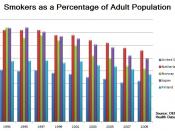The first article for review is titled Self-efficacy, Health Locus of Control, and Smoking. This article studies how the participants confidence levels and health locus prior to entering treatment predicts results of the quitting program. The program is called 'Fresh Start' and was conducted in Victoria, Australia. It consisted of three groups:
(A) those who made an attempt (Stop for one day),
(B) those who met criteria in A, and did not smoke for duration of program,
(C) those who abstained for six months.
Confidence was tested by questionnaires (post, during and at 6-month period). Health Locus is defined by how the participant attributed health outcomes (internal, external or by chance). The results of this experiment showed that those individuals across the three groups who had high levels of self-efficacy was related not to the number of attempts to quit, but the success of the attempts, while 'the role of Health Locus of Control [was found to be] complex needing further investigation' (Stuart, Borland, & McMurray, 1994, p.
1).
The second article for review is titled, Sensation Seeking, Nicotine Dependence, and Smoking Motivation in Female and Male Smokers. This study was conducted using a sample of French smokers (36 F, 60 M) and non-smokers (23 F, 45 M). The goal of the experiment was to study 'the relationship between sensation seeking and smoking' (p. 221). The objectives of the study was (a) to see if smokers are higher in sensation seeking than their non-smoking counterparts, (b) to see if there are any gender forces in smoking and sensation seeking, and (c) to examine 'in each sex, the nature of the relationship between sensation seeking and smoking' (p. 221).
These three items were measured on four sub-scales, they are:
1) The Disinhibition subscale (DIS) - shows desire to be...


